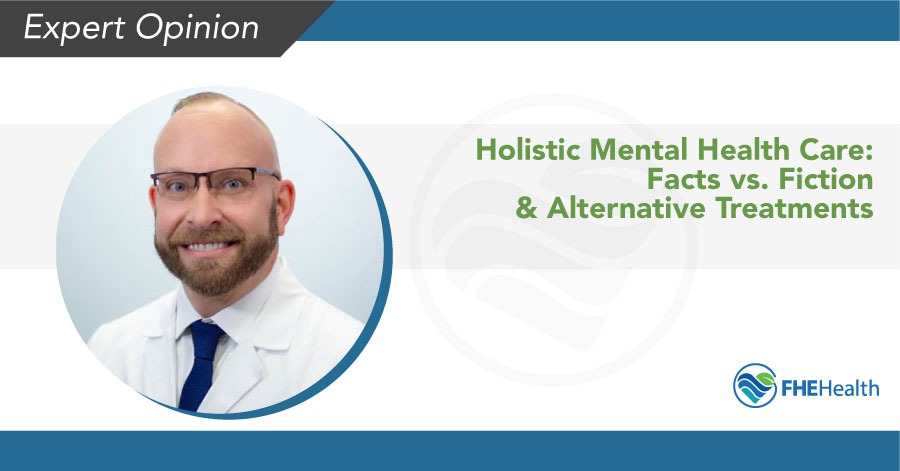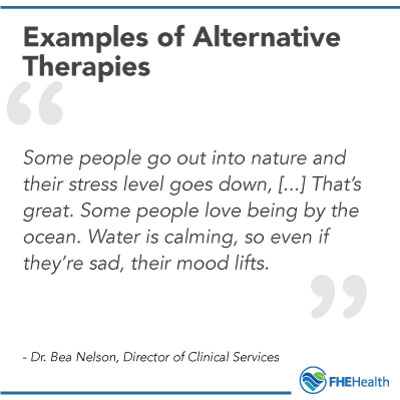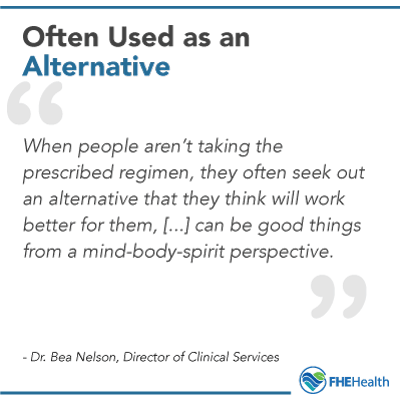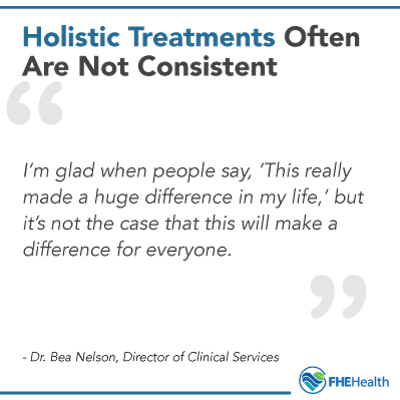
Today a growing body of alternative treatments for mental health, also known as holistic interventions, are taking consumers by storm. People rave about the wonders of natural herbs and plant-based supplements like St. John’s Wort for depression, Kava for anxiety, and CBD for pain and sleep (among many other “natural” cures for mental health ailments). Then there are those who swear by the mental health benefits of ancient Eastern practices like yoga, Reiki, and Tai Chi (among others.) Some of these holistic treatments have been integrated into mainstream Western medicine, having proved effective at addressing patients’ symptoms and improving recovery outcomes.
FHE Health Director of Clinical Services Dr. Beau Nelson understands the allure and popularity of these treatments. In fact, he celebrates those instances where people have legitimately found a holistic cure that’s safe and helpful. In the same breath, though, Dr. Nelson is quick to warn people about the facts vs. the fiction regarding alternative treatments….
What Is Holistic Mental Health Treatment?
Before unpacking the facts vs. the fiction regarding holistic mental health treatments, it’s helpful to have a working definition of holistic/alternative/complementary treatments. Here’s how Dr. Nelson defined them: “When people aren’t taking the prescribed regimen, they often seek out an alternative that they think will work better for them,” he said, pointing out these alternatives can comprise a wide range of options that “can be good things from a mind-body-spirit perspective.”
Two Examples of Holistic Treatments – Forest Therapy and Exercise
 By way of an example, he cited the relatively new holistic craze of “forest therapy” or “forest bathing.” (Yes, you read that correctly, but in this case the bathing isn’t literal and instead refers to an ancient Japanese practice of being mindfully present to the forest.)
By way of an example, he cited the relatively new holistic craze of “forest therapy” or “forest bathing.” (Yes, you read that correctly, but in this case the bathing isn’t literal and instead refers to an ancient Japanese practice of being mindfully present to the forest.)
“Some people go out into nature and their stress level goes down,” Dr. Nelson said. “That’s great. Some people love being by the ocean. Water is calming, so even if they’re sad, their mood lifts.”
Similarly, many people feel better after exercising, Dr. Nelson noted.
Holistic Can Be “Less Drastic” Option Before Medication and Therapy
“These are instances of normal mood fluctuations,” in which case “there’s a wide variety of things people can do … When people ask about things that are helpful for their mood, you start out with the less drastic means … I’ve noticed I’m feeling sad, and it hasn’t gone away … what are some things I can do without going to medication or therapy?”
Dr. Nelson explained that forest therapy can be “helpful for people when they’re not feeling good.” In fact, “there are many things that you can do,” he said, that fall within this category of being “healthy and helpful,” a.k.a. “complementary” or “holistic.”
Fact vs. Fiction: “Holistic Is Better for You Because It’s Natural.”
But there’s an important distinction between being “healthy and helpful” and proven to be medically and clinically therapeutic, according to Dr. Nelson. He explained that mental health disorders like depression, bipolar disorder, and schizophrenia are heavily genetic and biological in nature. They also entail much more severe symptoms than what a holistic treatment alone can help with.
In these cases, using holistic treatment as a substitute for medication (because it’s more “natural”) would probably not be entirely effective for you. Dr. Nelson used the example of taking St. John’s Wort when you have suicidal depression to show how medication is often the safer, better route.
In support of this view, there’s a large body of scientific literature attesting to the efficacy of certain psychotropic medications (like antidepressants) for mental health conditions. Dr. Nelson would know: Earlier in his career, he was a clinical rater for drug trials of these meds and saw firsthand how clinical studies were conducted to ensure objective results:
We would use standardized tests and we trained on specific protocols. The reason why this was done, in scientifically, research-based studies, is that this a real science. There are many things that can invalidate a study, two things that might not seem obvious might surprise you. One is when patients are reporting getting better just from spending more time with the physician: At some sites, the physician will spend 30 minutes and at others the physician will spend five mins; and, the patients who receive 30 minutes with the doctor get better. Then there’s the placebo effect (when patients get better simply because they believe a placebo substance is working).
The rigorous scientific controls in these trials helped ensure a credible body of evidence supporting particular medicines over others. In other words, “If depression were cured by eating bananas, why would we have a billion-dollar pharmaceutical business?,” Dr. Nelson quipped. “Everyone would just eat bananas.”
Dr. Nelson also noted that the distinction itself—holistic is natural and medication is synthetic—can be misleading. Many medications are derived from plants, he noted.
Fact vs. Fiction: “Holistic Treatment Can Work for Everyone.”
 Another lesson Dr. Nelson gained from working as a rater in clinical drug trials was this: “There’s a lot of variability when someone says they got better.” He elaborated:
Another lesson Dr. Nelson gained from working as a rater in clinical drug trials was this: “There’s a lot of variability when someone says they got better.” He elaborated:
I’m glad when people say, ‘This really made a huge difference in my life,’ but it’s not the case that this will make a difference for everyone. If the body were so one-to-one, such as L-Dopa for depression symptoms universally works—back in the day some people used witch hazel and it got better—well, we didn’t create a billion-dollar industry for no reason.
There are also differences culturally that, depending on one’s background, may influence what treatment a person chooses: “Some people use Shamanism; some people have an exorcism;
Some people use Reiki. Did people get better? I’m sure somebody did but I don’t know how.
Holistic isn’t just New Age or natural. It can be a lot of things—what you read on the Internet that someone says worked for them.”
This can be the danger of not consulting a doctor and merely following Internet advice about one or more holistic treatments. Dr. Nelson used the example of having a child with a serious mental health condition. In this situation, a parent would need to ask whether they’d really feel comfortable turning first to the Internet for treatment advice.
Facts vs. Fiction: “Holistic Treatments Are Safe in Any Amount.”
 There is a sense in which this statement is factual: Holistic treatments that don’t involve supplements—yoga, meditation, exercise, etc.—are typically not going to be harmful. There are some rare exceptions to this rule, however. For example, some people get hooked on exercise to such a degree that they injure themselves.
There is a sense in which this statement is factual: Holistic treatments that don’t involve supplements—yoga, meditation, exercise, etc.—are typically not going to be harmful. There are some rare exceptions to this rule, however. For example, some people get hooked on exercise to such a degree that they injure themselves.
There is another sense, though, in which this statement is fiction. Here Dr. Nelson pointed to the health risks that arise from taking too much of a supplement that in turn strains the liver or causes other symptoms. Another problem he has seen is when people take natural supplements alongside medications, not recognizing there can be harmful interactions.
The point is that just because a nutritional supplement may be plant-derived doesn’t make it safe to take more of or at any dose. Just as there can be unwanted side effects with many psychotropic medications, there can be unwanted side effects of taking holistic supplements that claim to be natural.
The bottom line is that people are “fragile and complex,” according to Dr. Nelson. What works for one person may not work at all for another. This is true regarding medications and holistic treatments. Often people with mental health conditions will benefit from a combination of medication, therapy, and holistic treatments. The key is not to go it alone. Consult your doctor first.






